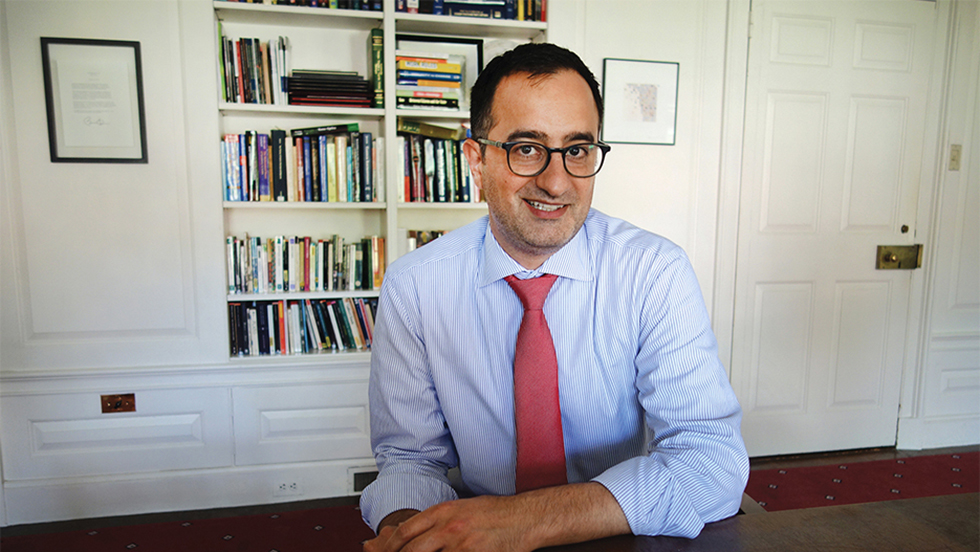
Rashid Zia, a Class of 2001 alumnus and Brown's senior academic undergraduate academic officer, says that the University's distinctive Open Curriculum empowered him to learn how to learn during his days as a student.
Credit: Frank Mullin / Brown Alumni Magazine
After a dozen years on the Brown University faculty, Associate Professor of Engineering and Physics Rashid Zia took the helm as Brown's new dean of the college on July 1, 2018.
As the University's senior undergraduate academic officer, Zia will oversee Brown's student-centered Open Curriculum, academic advising, international student programs and classroom instruction, among other responsibilities.
With classes for 2018-19 set to begin on Wednesday, Sept. 5, Zia — who is also a Class of 2001 alumnus of Brown — shared his insights on the Open Curriculum, undergraduate education and more with Brown Alumni Magazine. The Q&A will also run in BAM's upcoming September/October issue.
Q: Tell us about yourself. Where did you grow up and what was your path to Brown?
I grew up in Rhode Island but was born in Iran days before the start of the Iran-Iraq war. Education was transformational in my life. My father was the first in his family to go to college, and he received a scholarship to come to America for graduate school. When the war broke out, my father's education and close friends he made in school helped us build a new life here.
When I first visited Brown, philosophy professor John Ladd spent an hour on the steps leading to College Street talking to me and my friend about the value of a liberal education. I knew then that Brown was right for me.
I recall being inspired by classics professor Joe Pucci's essay on learning through choice, which encouraged exploration of courses outside our initial interests. So I took one English class, then another, and enjoyed them so much that I pursued a combined A.B.-Sc.B. degree in English and engineering.
Q: As a Brown alumnus, member of the faculty and incoming dean of the college, what do you see as the defining virtues of a Brown undergraduate education?
The core of the undergraduate experience is the Open Curriculum. Its student-centered approach promotes curiosity, fosters collaboration and demands intellectual rigor. It underpins the culture of open inquiry that defines Brown.
Enabling students to make choices promotes academic success in a way that fosters lifelong learning. As a student, I saw how the Open Curriculum empowered me to learn how to learn. As a teacher, I knew my students were in class because they wanted to be there, and because they wanted to be challenged.
Q: How do you think your Brown experience will shape what you do as dean of the college?
Navigating the freedom and responsibility of Brown can be daunting. I know firsthand the value of advising and mentorship. I am deeply indebted to the faculty, staff and students who helped me find my path at Brown years ago, and to the colleagues and students who support my continued learning today.
As dean, I see value in strengthening collaborations between students, staff and faculty. The key to both excellence and inclusion is encouraging one another's intellectual growth. Excellence is when all students are engaged, empowered and transformed by their education.
Q: You have been both a successful teacher and an award-winning researcher. Can a university be great at both research and undergraduate education?
Of course, because they share the same goals and methods. The work of a researcher, student or teacher is to follow curiosity, take on intellectual challenges and share knowledge. Research isn't an isolated pursuit. And it is in teaching others that we refine our ideas. What is amazing about Brown is the extent to which our students become active partners in research and teaching.
Research is also a generous endeavor. We are rewarded for the work of those we train. As an engineer and physicist, I pursue scientific discovery. But as a professor, my primary function is to train scientists so that they can advance the frontiers of knowledge and overcome future challenges. When they do, we all share the credit.
Q: Where do you see opportunities for Brown to grow innovative academic programs?
Brown has been a leader in active and experiential learning for decades with programs such as the Royce, UTRA and Writing Fellows. Brown students want to actively apply their knowledge across campus and around the world. We are building on this tradition through BrownConnect, Engaged Scholars and the Learning Collaborative.
With the upcoming 50th anniversary of the New Curriculum, we have an opportunity to examine and enhance the Brown undergraduate experience. Brown's priority remains the intellectual development of all students. To live up to the ideals of the student-led efforts that transformed the University, our student-focused curriculum must be a dynamic, living entity.
-Brown Alumni Monthly staff